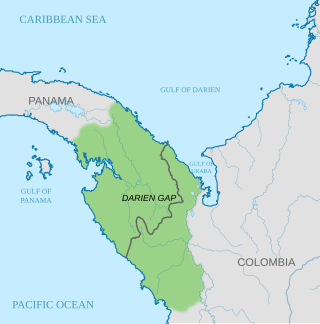| |||||
| Decades: | |||||
|---|---|---|---|---|---|
| See also: | |||||
The following lists events that happened during 2015 in Panama .
| |||||
| Decades: | |||||
|---|---|---|---|---|---|
| See also: | |||||
The following lists events that happened during 2015 in Panama .

Central America is a subregion of the Americas. Its boundaries are defined as bordering Mexico to the north, Colombia to the south, the Caribbean Sea to the east, and the Pacific Ocean to the west. Central America usually consists of seven countries: Belize, Costa Rica, El Salvador, Guatemala, Honduras, Nicaragua, and Panama. Within Central America is the Mesoamerican biodiversity hotspot, which extends from northern Guatemala to central Panama. Due to the presence of several active geologic faults and the Central America Volcanic Arc, there is a high amount of seismic activity in the region, such as volcanic eruptions and earthquakes which has resulted in death, injury, and property damage.

Panama, officially the Republic of Panama, is a transcontinental country spanning the southern part of North America and the northern part of South America. It is bordered by Costa Rica to the west, Colombia to the southeast, the Caribbean Sea to the north, and the Pacific Ocean to the south. Its capital and largest city is Panama City, whose metropolitan area is home to nearly half the country's 4 million inhabitants.

The history of Panama includes the history of the Isthmus of Panama prior to European colonization.

The Panama Canal is an artificial 82 km (51 mi) waterway in Panama that connects the Atlantic Ocean with the Pacific Ocean and divides North and South America. The canal cuts across the Isthmus of Panama and is a conduit for maritime trade. One of the largest and most difficult engineering projects ever undertaken, the Panama Canal shortcut greatly reduces the time for ships to travel between the Atlantic and Pacific oceans, enabling them to avoid the lengthy, hazardous Cape Horn route around the southernmost tip of South America via the Drake Passage or Strait of Magellan.

Telefónica, S.A. is a Spanish multinational telecommunications company headquartered in Madrid, Spain. It is one of the largest telephone operators and mobile network providers in the world. It provides fixed and mobile telephony, broadband, and subscription television, operating in Europe and the Americas.

The United States invasion of Panama, codenamed Operation Just Cause, began in mid-December 1989 during the presidency of George H. W. Bush. The primary purpose of the invasion was to depose the de facto ruler of Panama, General Manuel Noriega, who was wanted by U.S. authorities for racketeering and drug trafficking. The operation concluded in late January 1990 with the surrender of Noriega. The Panama Defense Forces (PDF) were dissolved, and President-elect Guillermo Endara was sworn into office.


APL, formerly called American President Lines Ltd., is an American container shipping company that is a subsidiary of French shipping company CMA CGM. It operates an all-container ship fleet, including nine U.S. flagged container vessels.


A trans man is a man who was assigned female at birth. The label of transgender man is not always interchangeable with that of transsexual man, although the two labels are often used in this way. Transgender is an umbrella term that includes different types of gender variant people. Trans men have a male gender identity, and many trans men choose to undergo surgical or hormonal transition, or both, to alter their appearance in a way that aligns with their gender identity or alleviates gender dysphoria.

Ricardo Alberto Martinelli Berrocal is a Panamanian politician and businessman who was the 36th president of Panama from 2009 to 2014.

The Torrijos–Carter Treaties are two treaties signed by the United States and Panama in Washington, D.C., on September 7, 1977, which superseded the Hay–Bunau-Varilla Treaty of 1903. The treaties guaranteed that Panama would gain control of the Panama Canal after 1999, ending the control of the canal that the U.S. had exercised since 1903. The treaties are named after the two signatories, U.S. president Jimmy Carter and the Commander of Panama's National Guard, General Omar Torrijos.

Ernesto Pérez Balladares González-Revilla, nicknamed El Toro, is a Panamanian politician who was the President of Panama between 1994 and 1999.

The Panama Canal expansion project, also called the Third Set of Locks Project, doubled the capacity of the Panama Canal by adding a new lane of traffic allowing for a larger number of ships, and increasing the width and depth of the lanes and locks allowing larger ships to pass. The new ships, called New Panamax, are about one and a half times the previous Panamax size and can carry over twice as much cargo. The expanded canal began commercial operation on 26 June 2016.
Grupo Banistmo was a Panamanian financial services company, and the largest in Central America. It was founded in 1984. In 1999 it began an expansion strategy that has resulted in the acquisition of banks in several Central American countries, as well as Colombia and the Bahamas. It was the holding company of Primer Banco del Istmo, S.A. or Banistmo, the largest bank in Panama. Its President and Chief Executive Officer was Alberto Vallarino. In November 2006 it was acquired by HSBC Holdings plc, and merged with HSBC Bank (Panama) S.A., the bank’s existing subsidiary in 2007. In 2013 Bancolombia Group acquired HSBC Panama and renamed it Banistmo.

William Henry Aspinwall was a prominent American businessman who was a partner in the merchant firm of Howland & Aspinwall and was a co-founder of both the Pacific Mail Steamship Company and Panama Canal Railway companies which revolutionized the migration of goods and people to the Western coast of the United States.

The Pacific Alliance is a Latin American trade bloc, formed by Chile, Colombia, Mexico and Peru, which all border the Pacific Ocean. The alliance was formed with the express purpose of improving regional integration and moving toward complete freedom in the movement of goods, services, capital and people between the four member states. Together, these four countries have a combined population of more than 230 million people and make up roughly 35 percent of Latin American GDP.

Trần Đại Quang was a Vietnamese politician and former police general who served as the eighth President of Vietnam from 2016 until his death in 2018. After serving for five years as the Minister of Public Security, Quang was nominated by his predecessor Trương Tấn Sang to the presidency and was elected to the post by the National Assembly of Vietnam on 2 April 2016. He was one of the country's top leaders and ranked second in the Politburo behind Nguyễn Phú Trọng, the Communist Party General Secretary.

The Panama Papers are 11.5 million leaked documents that were published beginning on April 3, 2016. The papers detail financial and attorney–client information for more than 214,488 offshore entities. The documents, some dating back to the 1970s, were created by, and taken from, former Panamanian offshore law firm and corporate service provider Mossack Fonseca, and compiled with similar leaks into a searchable database.

China–Panama relations are the bilateral relationships between the People's Republic of China and Republic of Panama. The relations between Panama and the Qing dynasty began in 1909 and modern relations began on 2 January 1922 between Panama and the Beiyang government of China. After the Chinese Civil War in 1949, relations were maintained with the Nationalist government of the ROC which retreated to the island of Taiwan, a former Qing province and later a dependency of the Empire of Japan that ruled from 1895 to 1945.